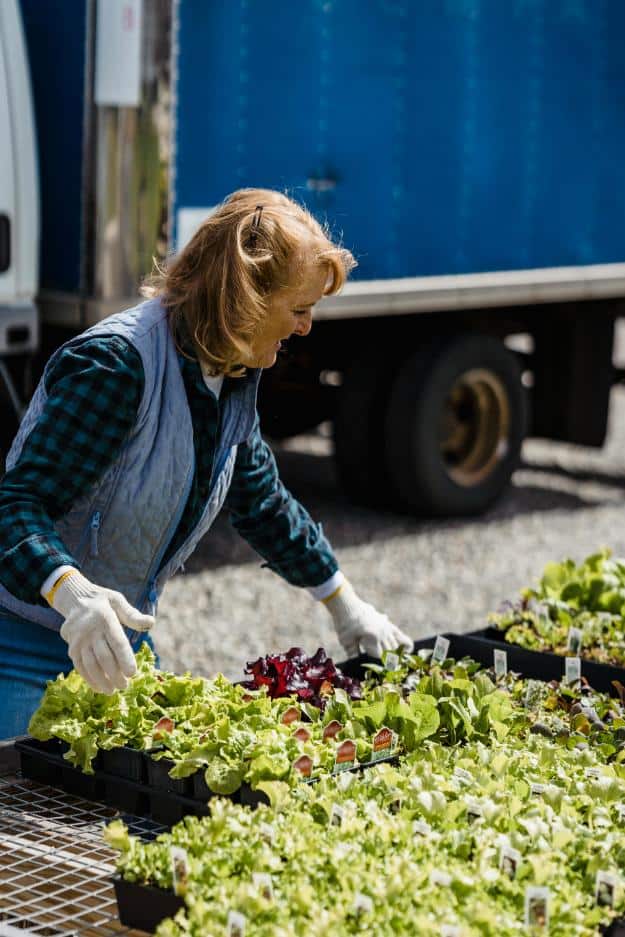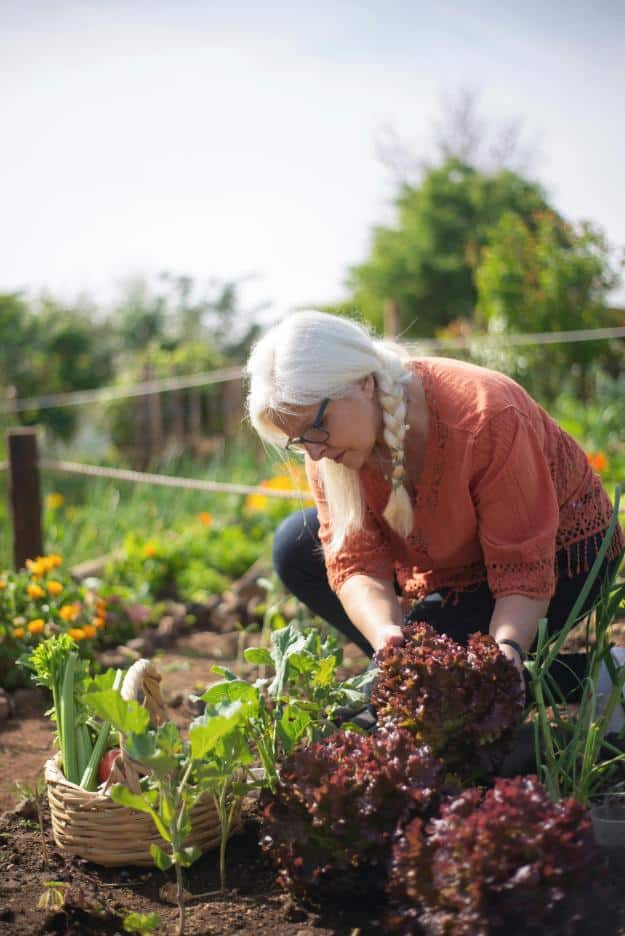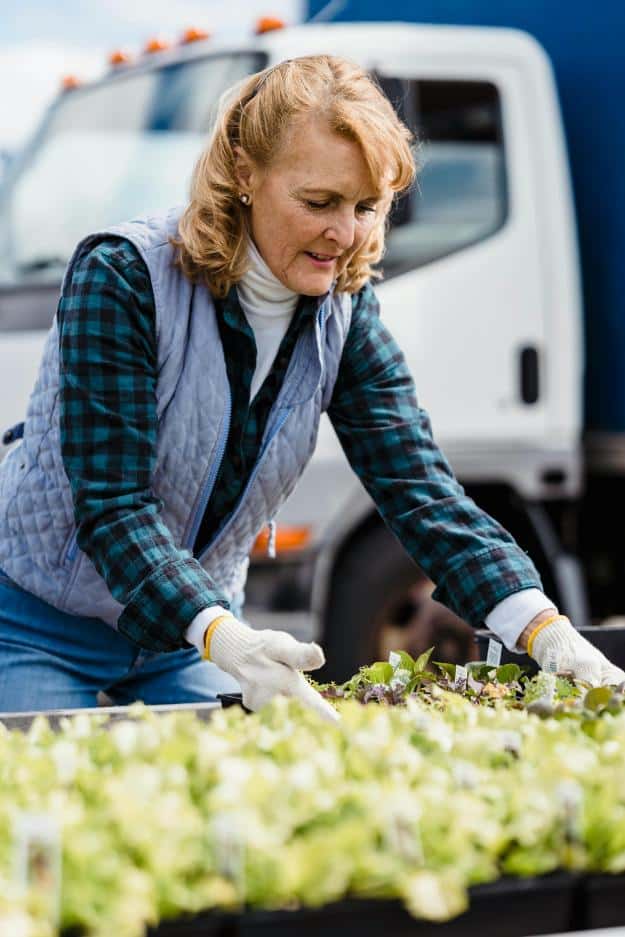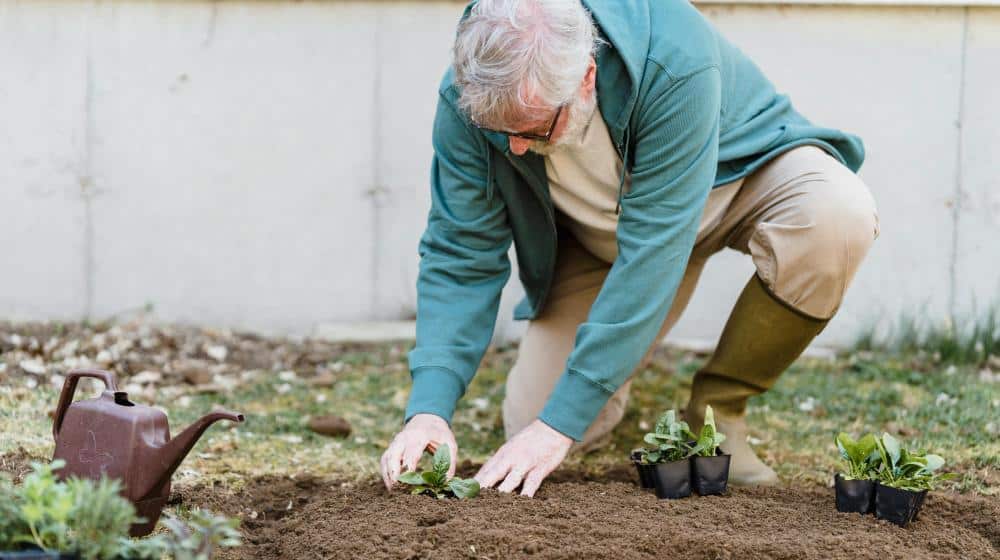Do you long to spend more time in nature, but find yourself feeling a bit less active than before? Gardening is a wonderful way to connect with the outdoors while offering a host of benefits for your physical and mental health.
Whether you’re an experienced green thumb or have never planted a seed, gardening has something to offer you!
Benefits of Gardening for Seniors
Gardening isn’t just about beautiful blooms – it’s about nurturing your own well-being! From boosting your physical health to calming your mind, this simple activity offers a surprising range of benefits for seniors.
Benefits of Gardening for Physical Health

You might be surprised to learn that gardening qualifies as a moderate-intensity exercise! OOf course, you can adjust the pace to suit your fitness level.
Here’s how gardening improves your physical health:
- Builds Strength: Digging, raking, weeding, and carrying supplies build strength in your arms, legs, and core.
- Improves Flexibility: Reaching, bending, and squatting enhance your range of motion and make everyday tasks easier.
- Boosts Balance:
The varied movements of gardening challenge your balance, which can help prevent falls. - Heart Health Benefits: Studies suggest gardening may lower blood pressure and reduce your risk of heart disease.
- Stronger Bones: Time in the sun gives you vitamin D, crucial for bone health and preventing osteoporosis.
- Weight Management: Gardening can help you maintain a healthy weight or even lose weight, further reducing your risk of chronic diseases.
- Reduces Pain: For those with arthritis, gentle gardening can increase flexibility and decrease joint pain.
- Gardening Keeps Your Mind Sharp:
Regular gardening can reduce your risk of dementia by up to 36%! It also helps you stay strong, improves coordination, and keeps your senses engaged.
Research shows these benefits increase with the time spent gardening. Even short sessions add up over time!
Benefits of Gardening for Mental Well-being
The beauty of a garden soothes more than just your eyes – it offers remarkable benefits for your mental and emotional well-being. Science confirms what many gardeners have long known: spending time with your plants can bring peace, joy, and even boost your brainpower.
Here’s how it works:
- Stress Reduction: The focus required for gardening distracts you from worries, and studies show it can lower levels of cortisol, the “stress hormone.” This sense of calm can last long after you put away your trowel.
- Anxiety Relief: Gardening significantly reduces anxiety symptoms. Researchers believe this is due to its combination of physical activity, focused attention, and connection to nature.
- Combats Depression: Spending time in nature has a proven mood-boosting effect. The act of nurturing your plants also adds a sense of purpose and accomplishment, further combating feelings of sadness or hopelessness.
- Cognitive Benefits: Gardening keeps your mind sharp! Planning your garden, remembering plant needs, and problem-solving challenges all give your brain a workout.
- Mindfulness: The colors, scents, and textures of a garden naturally pull you into the present moment, fostering a mindful state that carries over into other areas of your life.
You don’t need a sprawling backyard to reap these mental health benefits. Even tending to potted plants on your balcony offers a dose of nature’s healing power.
Benefits of Gardening for Social Connection
One of the joys of gardening is the community it fosters. Whether you share your harvest or simply exchange tips with fellow gardeners, it’s a fantastic way to connect.
- Community Gardens: A great way to meet like-minded people and learn from each other.
- Plant Swaps: Share your extra seedlings and discover new varieties with neighbors and friends.
- Share the Harvest: Brighten someone’s day with fresh vegetables or a bouquet of flowers from your garden.
Have you tried a local community garden or plant swap? If not, consider stepping outside your usual routine – you might make new friends and discover the rewarding feeling of gardening alongside others.
Gardening Tips for Seniors

Gardening is a wonderful activity for people of all ages, but as we get older, a few aches or limited mobility shouldn’t stop you from enjoying it. With some simple adjustments, you can tailor your garden to fit your needs and continue reaping the many rewards it offers.
Adapt Your Garden
- Raised Beds: Raised beds reduce bending and kneeling, making gardening accessible even with limited mobility. Build them at a height that lets you work comfortably while standing or seated.
- Container Gardening: Perfect for small spaces! Grow flowers, herbs, or vegetables in pots on your porch, balcony, or even indoors with sufficient sunlight.
Tools that Help
- Long Handles & Ergonomic Grips: These features minimize stress on joints and reduce hand fatigue. Look for tools specifically marketed for seniors or those with arthritis.
- Bright Colors: Easier to spot in the garden, which is especially helpful if you have any changes in vision.
Support Yourself
- Garden Stool: Choose a lightweight stool with a wide base for stability. This lets you rest comfortably without putting excess strain on your back or knees.
- Kneeling Pad: Invest in a thick, supportive kneeling pad if you sometimes prefer to work directly on the ground.
Listen to Your Body
- Pace Yourself: Start with short gardening sessions (even 10-15 minutes is beneficial) and gradually increase the time as you build strength and stamina.
- Rest When Needed: Don’t push through pain. Take breaks, alternate tasks, and prioritize your well-being over finishing everything in one session.
Warm Up
- Gentle Stretches: Focus on your arms, back, and legs. Simple movements like arm circles, shoulder rolls, and side stretches improve flexibility and reduce injury risk.
- Mindful Breathing: Take a few deep breaths before you begin. This calms the mind and helps you focus on proper form while gardening.
Beat the Heat
- Early Bird or Evening Gardener:
Avoid the hottest part of the day, usually between noon and 3pm. This protects you from heat exhaustion and helps your plants thrive. - Seek Shade: If possible, position your garden or containers in areas that get some afternoon shade, especially during summer months.
Hydration is Key
- Don’t Wait Until You’re Thirsty: Dehydration can set in quickly, especially for older adults. Sip water throughout your gardening session, even if you don’t feel thirsty.
- Flavor Boost: Try adding sliced fruit or herbs to your water for a refreshing change.
Dress for Success
- Skin Protection: Sunscreen, a wide-brimmed hat, and lightweight, long-sleeved clothing are vital, even on cloudy days.
- Footwear Matters: Sturdy, closed-toe shoes with good traction protect your feet and prevent slips or falls.
The most important thing is to listen to your body and have fun! With a few adaptations and a mindful approach, you can nurture a beautiful garden and a healthier, happier you for years to come.
Ready to Give It a Grow?

You don’t need acres of land to experience the joys of gardening! Whether you have a tiny balcony or simply prefer to start small, there are plenty of ways to create a thriving garden within your space.
Beginner-Friendly Garden Ideas for Seniors
- Herb Garden: Imagine fresh basil for your pasta or a sprig of mint in your tea! A few pots on a sunny windowsill provide a bounty of flavors year-round.
- Succulent Garden: These low-maintenance beauties come in a fascinating array of shapes and colors. Group them in a decorative container for hassle-free greenery.
- Tomato Plants: There’s nothing quite like the taste of homegrown tomatoes! Even one or two plants in pots can yield a surprisingly delicious harvest.
Most edible plants need at least 6 hours of sunlight a day. Observe your space to find the sunniest spots. Invest in good potting soil and containers with drainage holes for the healthiest plants.
These are just a starting point – as your confidence grows, so can your garden! The key is to start with something manageable and enjoy the process of discovery.
Subscribe to Our Blog
Exploring senior living solutions? At the Ultimate Senior Resource, we’re keen to learn about your individual needs and discuss how we can support you in achieving them. Our blog is just one of the valuable tools we provide to educate and motivate seniors to lead enriching and prosperous lives. Contact us today to book a virtual tour.


